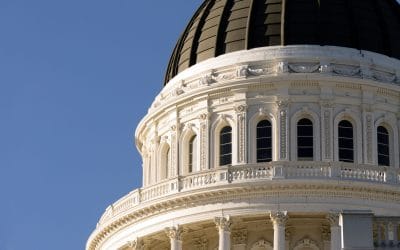2022 was a relatively quiet year in terms of the Legislature making significant changes to curriculum & instruction in California’s schools. This was largely driven by the focus on COVID-19 impact mitigation and the continued implementation of new programs in the early learning and expanded learning spaces contained in the State Budget (see previously released School Finance section).
Bill authorizes interdistrict agreements to help maintain student access to STEM and dual immersion courses
In an effort to address the increasing impacts of natural disasters and the educator shortage on course offerings, Senator Anthony Portantino (D-Pasadena) authored, and Governor Newsom signed, SB 941. The bill authorizes local educational agencies (LEAs) to enter into agreements to offer the same or similar corresponding individual courses or coursework to a student from another LEA who has been impacted disruptions, cancellations, or teacher shortages in science, technology, engineering, and mathematics (STEM) or dual immersion programs. Students must be selected through a publicly announced and unbiased process and does not allow the LEA to inquire about student characteristics or assess them in order to determine entry. This bill sunsets July 1, 2029.
Bills extend, establish new flexibilities to help students meet state and local graduation requirements
Since the 2012-13 school year, students have been authorized to use the completion of a career technical education (CTE) course in lieu of completion a course in visual or performing arts or a foreign language, for purposes of meeting state graduation requirements. However, the authorization for CTE to count toward that graduation requirement was set to expire on July 1, 2022.
In an effort to extend that sunset date, Assembly Member Patrick O’Donnell (D-Long Beach) ran AB2044, which would have extended the availability of this option an additional five years. However, when AB 2044 eventually stalled in the Senate Education Committee at the end of June, education advocates moved swiftly to get the extension in budget clean-up language. Under AB 185, the K-12 Education Omnibus Clean-Up Trailer Bill, the authorization for students to meet this graduation requirement through completion of a CTE course has been extended to July 1, 2027.
If a student completed a CTE course that met that graduation requirement between July 1, 2022 and the operative date of the trailer bill (i.e. September 27, 2022), the bill requires the course to be deemed to have fulfilled that requirement. While legislation signed this year would usually take effect January 1, 2023, as a budget bill, AB 185 took effect immediately upon the Governor’s signature.
Additionally, Senator Anna Caballero (D-Salinas) authored SB 532, which expands the rights of foster youth, homeless youth, former juvenile court students, children of military families, and migratory children to be exempted from local graduation requirements if certain criteria are met. It also requires LEAs to allow these high school students to remain for a fifth year to complete statewide coursework requirements (they’re not required to meet local graduation requirements). LEAs must also report this data to the California Department of Education (CDE).
Assessment and accountability legislation narrowed down before reaching Governor’s desk
Policy changes in the areas of school assessment and accountability are largely the purview of the State Board of Education (SBE). As a result, few bills in these areas make it through the legislative process. This year, among the bills in these areas approved by the Governor are two that are particularly relevant as they were significantly narrowed in order to obtain a signature. AB 22, authored by Assembly Member Kevin McCarty (D-Sacramento), when originally introduced in 2021, would have created a process for gradually including all four-year-olds in transitional kindergarten. However, when that proposal was included in the 2021-22 state budget, the bill was amended to focus on the collection of data for state preschool.
AB 1868, authored by Assembly Member Luz Rivas (D-Arleta), initially would have required the governing board of a school district or a county office of education (COE), and the governing body of a charter school, to set goals and delineate investments focused on the needs of English learners (ELs) at risk of becoming long-term ELs (LTELs), and LTELs in its local control and accountability plan (LCAP); and required CDE to post on its website academic and other outcome data disaggregated by English language acquisition status. However, in its final version, the bill was narrowed to require CDE to annually report specified enrollment and assessment outcome information related to English language learners.
The Governor signed the following curriculum and instruction bills:
Accountability
- AB 1868 (Rivas, Luz) – School accountability: English language acquisition status: data.
This bill requires the California Department of Education (CDE) to annually report specified data on English Learners (Els), including enrollment data by English language acquisition status and disability and specified student performance and outcome data by English language acquisition status. The report must be posted on CDE’s website and the data limited to the California Assessment of Student Performance and Progress (CAASPP) in English language arts, mathematics and science and the English Language Proficiency Assessments for California (ELPAC)
Chapter 907, Statutes of 2022 - SB 997 (Pan) – Local control and accountability plans: parent advisory committee: student advisory committee.
SB 997 requires school districts serving middle or high school students and county offices of education (COEs), by July 1, 2024, to either include at least two students as full members on an existing parent advisory committee or establish a student advisory committee for purposes of developing and adopting the Local Control and Accountability Plan. The bill requires a school district and a county superintendent of schools to take into consideration that the pupil members of a parent advisory committee or student advisory committee represent the specified diversity of the school district or county’s pupils, and that particular effort should be made to reach out to at-risk or disadvantaged pupils to serve.
Chapter 922, Statutes of 2022
Adult Education
- ACR 163 (Medina) – Adult Education Week.
ACR 163 proclaimed the week of March 27, 2022, to April 2, 2022, inclusive, as Adult Education Week, and honors the teachers, administrators, classified staff, and students of adult education programs statewide for their efforts, persistence, and accomplishments.
Chapter 51, Statutes of 2022
Assessments
- HR 101 (Jones-Sawyer) – Relative to pupil instruction.
HR 101 resolves that the Assembly encourages each school district to commit to achieving equity in college and career readiness for all pupils, especially those who are Black, Latinx, and Filipinx, emergent bilingual speakers, pupils with disabilities, foster youth, and experiencing homelessness, and to appreciate that a supportive approach to mastery-based learning and grading may be one important step towards doing so.
Adopted
Career Technical Education
- AB 1923 (Mathis) – Partnership academies: science, technology, engineering, and mathematics (STEM).
Current law requires the Superintendent of Public Instruction (SPI) to issue grants to school districts, to plan, establish, and maintain these California Partnership Academies, which promote state-school- private sector partnerships combining academic and vocational training to high school pupils who present a high risk of dropping out of school, and motivating them to stay in school and graduate. This bill requires the SPI to prioritize proposals for new partnership academies based upon a school district’s enrollment of unduplicated pupils, pupils from groups historically underrepresented in career technical education or science, technology, engineering, and mathematics (STEM) programs or professions, and at-promise pupils. The bill also authorizes the SPI to prioritize partnership academies for school districts located in a rural area or an economically disadvantaged area.
Chapter 114, Statutes of 2022 - SB 941 (Portantino) – Local educational agency instruction collaboration agreements: science, technology, engineering, and mathematics: dual language immersion programs.
SB 941 authorizes the governing board of a school district, a county board of education, or the governing body of a charter school to enter into an agreement with one or more local educational agencies (LEAs) to offer the same or similar corresponding individual courses and coursework to pupils from other LEAs who have been impacted by disruptions, cancellations, or teacher shortages in STEM classes, or dual language immersion programs. The bill requires an LEA subject to the agreement to accept pupils through an unbiased process that prohibits an inquiry into, or evaluation or consideration of, specified pupil characteristics and to hold random drawings to determine approval for study when the number of pupils seeking a classroom opportunity exceeds the available number of seats in a classroom, as provided, and to publicly post certain information related to these opportunities.
Chapter 711, Statutes of 2022
Curriculum and Instruction
- AB 1703 (Ramos) – California Indian Education Act: California Indian Education Task Forces.
This bill establishes the California Indian Education Act and encourages school districts, county offices of education (COEs), and charter schools to form California Indian Education Task Forces with California tribes local to their regions or tribes historically located in the region. The bill encourage task force participants to discuss issues of mutual concern and to do the following work:- Develop a thorough, shared understand of accurate, high-quality curricular materials about the history, culture, and government of local tribes, and develop curricular materials for use within LEAs.
- Develop a shared understanding of proper or improper instructional material when these materials use depictions of Native Americans
- Encourage LEAs to adopt curriculum developed by the Task Forces
- Identify the extend and nature of the achievement gap between Indian pupils and other pupils, and identify the strategies necessary to close it.
The bill requires the Task Forces to submit, within one year of formation and annually thereafter, a report of findings to the California Department of Education (CDE). The bill then requires CDE to submit, within one year of receiving task force reports and annually thereafter, a report to the Senate Assembly Education Committees, regarding the narrowing of the achievement gap and the adoption of curriculum.
Chapter 477, Statutes of 2022 - AB 2028 (Davies) – Pupil instruction: bicycle and scooter safety instruction.
Current law provides that the governing board of any school district having jurisdiction over any elementary, intermediate, or junior high school may provide time and facilities to any local law enforcement agency having jurisdiction over the schools of the district, for bicycle safety instruction. This bill expands the types of eligible training to include training on scooter, electric bicycle, motorized bicycle, or motorized scooter safety instruction and expands this authorization to also include providing time and facilities to any nonprofit organization, club or association organized to promote youth and school activities, or public agency that provides the relevant training.
Chapter 116, Statutes of 2022 - ACR 133 (Rivas, Luz) – Introduce a Girl to Engineering Day.
This Assembly Concurrent Resolution proclaimed February 24, 2022, as Introduce a Girl to Engineering Day.
Chapter 26, Statutes of 2022 - HR 113 (Bonta, Mia) – Relative to civics education.
HR 113 resolves that the Assembly urges the State Board of Education to consider the value of civics education and ensure the inclusion of civics education instruction and modules as a requirement to graduate from California high schools.
Adopted - SB 1299 (Min) – Pupil instruction: California State Summer School for Mathematics and Science:eligibility: funding: tuition and application fee.
Current law establishes the California State Summer School for Mathematics and Science to provide academic development to enable pupils, including pupils who are not California residents, with demonstrated academic excellence in mathematics and science who meet one of 3 specified enrollment criteria to receive intensive educational enrichment in these subjects. SB 1299 limits school eligibility to pupils from a California school and deletes provisions related to the admission of pupils who are not California residents to the summer school. The bill also raises the applicant fee to $40 (up from “not to exceed thirty dollars ($30)) and the tuition fee to $4,770 (up from $2,810) in 2023 and authorizes the applicant fee to be increased by up to 5% each year thereafter.
Chapter 334, Statutes of 2022 - SCR 80 (Cortese) – Visual and Performing Arts Education Month.
SCR 80 proclaimed March 2022 as Visual and Performing Arts Education Month and urges all residents to become interested in and give full support to quality visual and performing arts education programs for children and youth.
Chapter 31, Statutes of 2022 - SCR 90 (Gonzalez) – Women and Girls in STEM Week.
This Senate Concurrent Resolution designated April 3, 2022, to April 9, 2022, inclusive, as Women and Girls in STEM Week and encouraged all citizens and community organizations to support the observance of California’s Women and Girls in STEM Week by encouraging and celebrating women in the STEM fields.
Chapter 59, Statutes of 2022
Data
- AB 22 (McCarty) – Preschool data: data collection.
Current law establishes the California Longitudinal Pupil Achievement Data System, maintained by CDE, which consists of pupil data from elementary and secondary schools relating to demographics, program participation, enrollment, and statewide assessments. Current law requires the system to be used to accomplish specified goals, including to provide an efficient, flexible, and secure means of maintaining statewide pupil level data. AB 22 requires CDE, by July 1, 2024, to collect pupil data for each pupil enrolled in a California state preschool program operated by a local educational agency (LEA), including all applicable data elements that are collected for pupils in transitional kindergarten. The bill also requires CDE, by July 1, 2024, to collect the same data for educators in a California state preschool program operated by a local educational agency that is collected for educators in the K–12 classroom setting.
Chapter 901, Statutes of 2022
Graduation Requirements
- SB 532 (Caballero) – Pupil instruction: high school coursework and graduation requirements: exemptions and alternatives.
This bill expands the rights for foster youth, homeless youth, former juvenile court school students, children of military families, migratory children, and students participating in a newcomer program (highly mobile students) to be exempted from local graduation requirements. The bill also requires LEAs to provide these students the option to remain in school for a fifth year to complete the statewide coursework requirements; specifies the contents of transcripts when transferred to a new LEA; and requires LEAs to annually report to CDE on the number of students, who in the prior school year, graduated with an exemption from the LEA’s local graduation requirements.
Chapter 918, Statutes of 2022
Special Education
- SB 291 (Stern) – Advisory Commission on Special Education.
Current law establishes the Advisory Commission on Special Education as an entity in state government consisting of 17 members to, among other things, study and provide assistance and advice to the State Board of Education, the Superintendent of Public Instruction, the Legislature, and the Governor in new or continuing areas of research, program development, and evaluation in special education. SB 291 increases the number of members on the commission to 19 and requires the commission to appoint 2 pupils with exceptional needs, 16 to 22 years of age, inclusive, to the commission for a term of one year.
Chapter 917, Statutes of 2022 - SB 692 (Cortese) – Special education: pupils with disabilities: least restrictive environment.
SB 692 requires CDE to, on or before November 30, 2023, publish data related to federal measures of least restrictive environment for pupils with disabilities on its website and to also include it as a resource on the California School Dashboard.
Chapter 919, Statutes of 2022 - SB 1016 (Portantino) – Special education: eligibility: fetal alcohol spectrum disorder.
Current regulations provide that a child who is assessed as having a specified health impairment or other health impairment is entitled to special education and related services. Those regulations define “other health impairment” as having limited strength, vitality, or alertness, including a heightened alertness to environmental stimuli, that results in limited alertness with respect to the environment that is due to a chronic or acute health problem and adversely affects the child’s educational performance. This bill requires the SBE to include “fetal alcohol spectrum disorder” in that definition of “other health impairment.”
Chapter 611, Statutes of 2022 - SCR 91 (Hurtado) – Individuals with Developmental Disabilities Inclusion Month.
This Senate concurrent resolution proclaims the month of May 2022 as Individuals with Developmental Disabilities Inclusion Month.
Chapter 74, Statutes of 2022 - SJR 4 (Wilk) – Special education funding.
This Senate joint resolution memorializes the 117th United States Congress and the President of the United States to enact legislation, S. 3213, known as the IDEA Full Funding Act, which would fully fund the federal Individuals with Disabilities Education Act.
Chapter 114, Statutes of 2022
Capitol Advisors Group has produced a set of comprehensive client briefs detailing new education laws that were passed by the Legislature and signed into law by Governor Newsom in 2022. Each brief is organized by subject area and includes an executive summary highlighting major changes we think you should know about. Bills signed by the Governor take effect on January 1, 2023, unless the bill specifically states otherwise.




What is CCIS’s opinion on AB130 and the use of the Master Agreement?